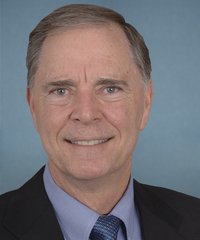
Congressman Bill Posey represents Florida's 8th Congressional District which encompasses all of Brevard and Indian River Counties, and a small portion of Orange County (Bithlo, Christmas and Wedgefield). Posey, a Republican, was elected to U.S. House of Representatives in 2008 and is currently serving his seventh term.
In the House, Congressman Posey serves on the Financial Services Committee and its two subcommittees on Consumer Protection & Financial Institutions and Housing, Community Development & Insurance.
Posey also serves on the Committee on Science, Space and Technology and its subcommittee on Space & Aeronautics.
The public has a strong interest in government accountability and rightly so. There's always room for more sunshine and transparency in the halls and offices of our government. Whether we're talking about votes in Congress or wasteful government spending, accountability is important to the integrity of our system of self-government.
Leading By Example
Rep. Posey believes in leading by example and here's how he's doing it:
Voting Against Congressional Pay Increases: Rep. Posey has voted to block Congressional pay increases, returned the pay raise every year (that was approved before Rep. Posey came to Congress in 2009), and returned full pay for service during federal government shutdown. Furthermore, Rep. Posey proposed ending the Congressional death gratuity so that Members of Congress are required to purchase their own life insurance rather than getting a taxpayer handout when they die (H.R. 3127) and voted to cut Congressional pensions (H.R. 3630). Rep. Posey has cut his own office budget by more than $900,000 since coming to Congress.
A Transparent Legislative Process: One of Rep. Posey’s guiding principles has been “If I can’t read it, my vote is NO.” To help combat “Too Big to Read” bills, Rep. Posey introduced legislation requiring at least 72 hours for the public and Congress to review bills before a House floor vote can take place (Adopted as House Rule Reform, 2011). He also passed a House rule requiring legislation to be made more transparent and easier to read by moving the House to a continuous revision law system like the one we have in Florida.
Draining the Swamp
Rep. Posey has introduced several pieces of legislation as part of his "Drain the Swamp" initiative to close lobbyist loopholes and make Washington more efficient, accountable and transparent:
Extending the Lobbying Moratorium: H.R. 383 extends the lobbying moratorium on Members of Congress when they leave office to five years, and up to two years for senior staff and other employees of the legislative branch.
More Accountability for Lobbyists Representing Foreign Governments: H.R. 3505 prohibits former Members of Congress and senior staff who lobby on behalf of foreign governments from receiving any federal benefits resulting from their service in Congress.
Adding Transparency to the Federal Rulemaking Process: The Article I Restoration Act (H.R. 3506) requires all new regulations to sunset after 3 years and empowers Congress and gives the American people input in deciding which regulations should be enacted and reauthorized. Furthermore, additional legislation (H.R. 4003) was introduced to make federal agencies eliminate old and ineffective rules before instituting new regulations.
Stopping Out-of-Control Government Lawsuits: H.R. 4002 says that, when federal agencies sue individuals or businesses and are in turn sued by individuals, the agency must pay all settlements, judgments, and attorney fees of the prevailing party from its administrative budget.
Applying the Law to Everybody: Introduced H.R. 4004 to better ensure that Washington lives by the rules it creates by mandating White House staff sign up for Obamacare health plans.
Preventing Insider Trading: Cosponsored and voted for the STOCK Act to ensure that Members of Congress don’t trade stock based on insider information (P.L. 112-105). Rep. Posey also filed an amendment to stop sweetheart investment deals that enable Members of Congress to participate in Initial Public Offerings (IPOs) not available to the general public (H.R. 3606).